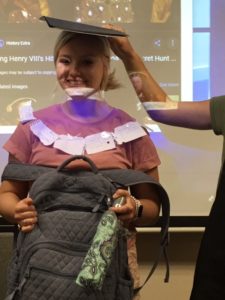A new program aimed at encouraging entrepreneurship has begun at Waynesburg University. The Entrepreneurial Leadership Faculty Fellows Program is officially underway, as two faculty members were named as inaugural fellows. Melanie Catana, director of choral music, and Andrew Heisey, chair of the Fine Arts Department, were both named the first fellows of the program last year.
The purpose of the program is to celebrate the spread of core entrepreneurial principles across campus, which include analytical thinking, innovation, active learning, creativity, among others.
 Melanie Catana, for The Yellow Jacket
Melanie Catana, for The Yellow JacketCatana actively involves these principles in her curriculum, which is why she applied for the program. Catana said that her passion for entrepreneurial learning began as a music school student, where she took an active learning course that she found compelling.
“We hardly ever sat down,” Catana said. “We were always moving, always having group activities. The way they do it in music is that there would be someone playing the piano or playing a recording that was specifically chosen to work on a specific skill set in music. Then they would have you step to it or clap to it and they would keep upping the level of coordination in order to activate the music instead of just listening to it.”
Catana started implementing aspects of that course in her upper-level courses and has grown it into a full course that will be taught in the spring.
“It’s called creativity and problem solving through music and movement,” Catana said. “I’m hoping to get a wide range of students that are just ready to experiment. You don’t have to be particularly gifted or knowledgable in music, because it’s going to be more experimental.”
Catana is already starting to gear her current courses towards entrepreneurial ideas, such as her survey of music in worship course.
“Every day in class I’ve been challenging myself to prep activities.” Catana said. “My goal is that I only lecture for 10 minutes at a time and then we do something.”
One day in the class, Catana had students use legos to visually describe the day of a monk while studying medieval music. In another instance, Catana had a class act out monks resisting the note system of music.
“I’m pretty sure no one is going to forget that, because of what they did,” Catana said. “If I would have just lectured about it, it would have just been like ‘Yeah, whatever’.”
The active learning has helped students become more engaged in Catana’s finding. Her students are now participating regularly.
“So far, I’m really excited,” Catana said. “It has really energized my teaching because it’s made me look forward to that class because we have a lot of fun.”
